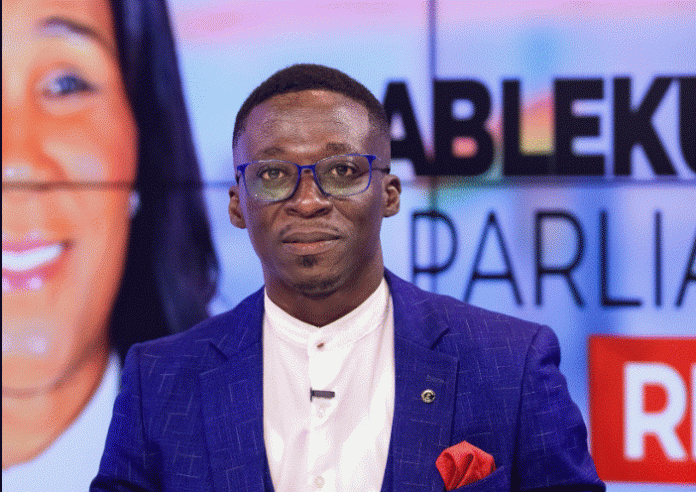A prominent private legal practitioner has accused Ghana’s Police Service of manipulating legal procedures to indefinitely detain New Patriotic Party Bono Regional Chairman Kwame Baffoe, known as Abronye, as the controversy escalates into a broader constitutional rights debate.
Austin Kwabena Brako-Powers condemned what he described as police exploitation of legal loopholes during an appearance on TV3’s News360 Friday, following a court’s decision to remand Abronye for the second consecutive week despite facing only misdemeanor charges.
The legal challenge comes as Abronye has reportedly begun a hunger strike in protest of his continued detention, raising the stakes in what has become a high-profile test of Ghana’s criminal justice procedures and constitutional protections.
Abronye was arrested September 8, 2025, on charges of offensive conduct conducive to breach of peace and publication of false news, with his case adjourned to September 19 after prosecutors requested additional investigation time.
Abronye was arrested September 8, 2025, on charges of offensive conduct conducive to breach of peace and publication of false news, with his case adjourned to September 19 after prosecutors requested additional investigation time.
Both Kpebu and Brako-Powers emphasized that courts possess immediate authority to address bail applications rather than waiting for scheduled hearings, with Kpebu noting that “the courts have made it clear that they will sit any day” when proper procedures are filed.
“I have said that the police take advantage of the loopholes in our laws to remote-control accused persons,” Brako-Powers stated, emphasizing that the nature of the charges should warrant immediate bail consideration rather than extended custody.
The legal controversy has drawn sharp political reactions, with NPP Majority Leader Alexander Afenyo-Markin questioning why Abronye was transferred to National Intelligence Bureau custody after initially honoring a police invitation with his legal team.
The case has attracted unusual political solidarity, with even critics like musician Kwame Asare Obeng (A Plus) condemning the detention as inappropriate for someone arrested over comments rather than criminal acts.
Legal activist Oliver Barker-Vormawor has also criticized the police leadership, suggesting the arrest represents broader concerns about law enforcement overreach in handling political criticism and public commentary.
The detention has generated significant public attention, with party supporters gathering at court proceedings to show solidarity, singing as Abronye was transported in police vehicles. The visible political dimensions of the case have intensified scrutiny of police motives and judicial decision-making.
Brako-Powers invoked the Supreme Court’s Martin Kpebu No. 2 precedent, arguing that while courts possess discretionary powers under Section 96(5) of Act 30 to deny bail, such decisions must be justified by sound reasoning rather than accommodating police convenience.
The legal expert specifically challenged the court’s acceptance of ongoing investigation arguments for misdemeanor charges, suggesting that such reasoning could set dangerous precedents for indefinite detention of accused persons awaiting trial.
The controversy has emerged amid broader questions about press freedom and political expression in Ghana, particularly regarding the boundaries between legitimate criticism and criminal conduct in public discourse.
Adding complexity to the situation, reports indicate Abronye applied for asylum in multiple countries including Côte d’Ivoire, the United States, France, Italy, Canada, Spain, the United Kingdom, and Germany shortly before his arrest, raising questions about whether these applications influenced detention decisions.
The timing of the asylum applications and subsequent arrest has fueled speculation about potential connections between Abronye’s legal troubles and his apparent concerns about personal safety or political persecution.
Legal observers note that the case tests Ghana’s commitment to constitutional protections while navigating the intersection of criminal law, political expression, and individual rights. The outcome could influence future approaches to similar cases involving public figures and political commentary.
Brako-Powers warned that continued accommodation of police tactics that prolong detention unnecessarily risks undermining public confidence in Ghana’s justice system. His call for judicial assertiveness reflects broader concerns about institutional independence and constitutional governance.
The constitutional implications extend beyond individual rights to fundamental questions about the balance of power between law enforcement, the judiciary, and constitutional protections for accused persons in Ghana’s democratic system.
As Abronye’s hunger strike continues and his next court appearance approaches September 19, the case represents a critical test of whether Ghana’s legal institutions will prioritize constitutional rights or accommodate what critics describe as politically motivated law enforcement tactics.
Source: newsghana.com.gh











